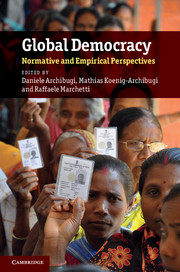Book contents
- Frontmatter
- Contents
- Figures
- Tables
- Notes on contributors
- Acknowledgements
- 1 Introduction
- 2 Models of global democracy
- 3 Citizens or stakeholders?
- 4 Is democratic legitimacy possible for international institutions?
- 5 Cosmopolitan democracy
- 6 Regional versus global democracy
- 7 Towards the metamorphosis of the United Nations
- 8 Flexible government for a globalized world
- 9 Global democracy and domestic analogies
- 10 Global democracy for a partially joined-up world
- 11 Civil society and global democracy
- 12 Global capitalism and global democracy
- 13 From peace between democracies to global democracy
- 14 The promise and perils of global democracy
- Index
- References
8 - Flexible government for a globalized world
Published online by Cambridge University Press: 05 June 2012
- Frontmatter
- Contents
- Figures
- Tables
- Notes on contributors
- Acknowledgements
- 1 Introduction
- 2 Models of global democracy
- 3 Citizens or stakeholders?
- 4 Is democratic legitimacy possible for international institutions?
- 5 Cosmopolitan democracy
- 6 Regional versus global democracy
- 7 Towards the metamorphosis of the United Nations
- 8 Flexible government for a globalized world
- 9 Global democracy and domestic analogies
- 10 Global democracy for a partially joined-up world
- 11 Civil society and global democracy
- 12 Global capitalism and global democracy
- 13 From peace between democracies to global democracy
- 14 The promise and perils of global democracy
- Index
- References
Summary
The quest for a world government
The fundamental conflict between globalization and democracy has often been discussed. It has led to two quite different, and in many respects even opposite, reactions:
‘Idealists’ resurrect the perennial dream of a world government committed to the rule of law, human rights and democratic procedures (see Archibugi et al. and Marchetti, both this volume). Many see the United Nations (UN) as the preliminary form of such a world government and are prepared to take its well-known limitations as a transitory phase that will be overcome with time.
‘Market believers’ rely on the global market to essentially solve all problems, provided governments do not interfere. They generally admit the necessity of having some rules to the game (such as a guarantee of property rights) but they believe that such rules emerge endogenously as a result of international competition.
Both reactions are seriously lacking. The notion of a world government tries to superimpose a power structure on existing national government. It naively presumes that a world government would act out of global interest. However, even a representative democratic world government could not provide true democratic governance, but would exhibit pervasive government failure due to its large distance from the citizens and its monopoly power (see also the similar criticisms by Christiano, this volume). At best, such a ‘world’ government is the apex of the dominant world power (today the United States), which certainly does not meet the ideal of an institution fairly and equitably serving the interests of mankind.
- Type
- Chapter
- Information
- Global DemocracyNormative and Empirical Perspectives, pp. 150 - 159Publisher: Cambridge University PressPrint publication year: 2011
References
- 1
- Cited by



